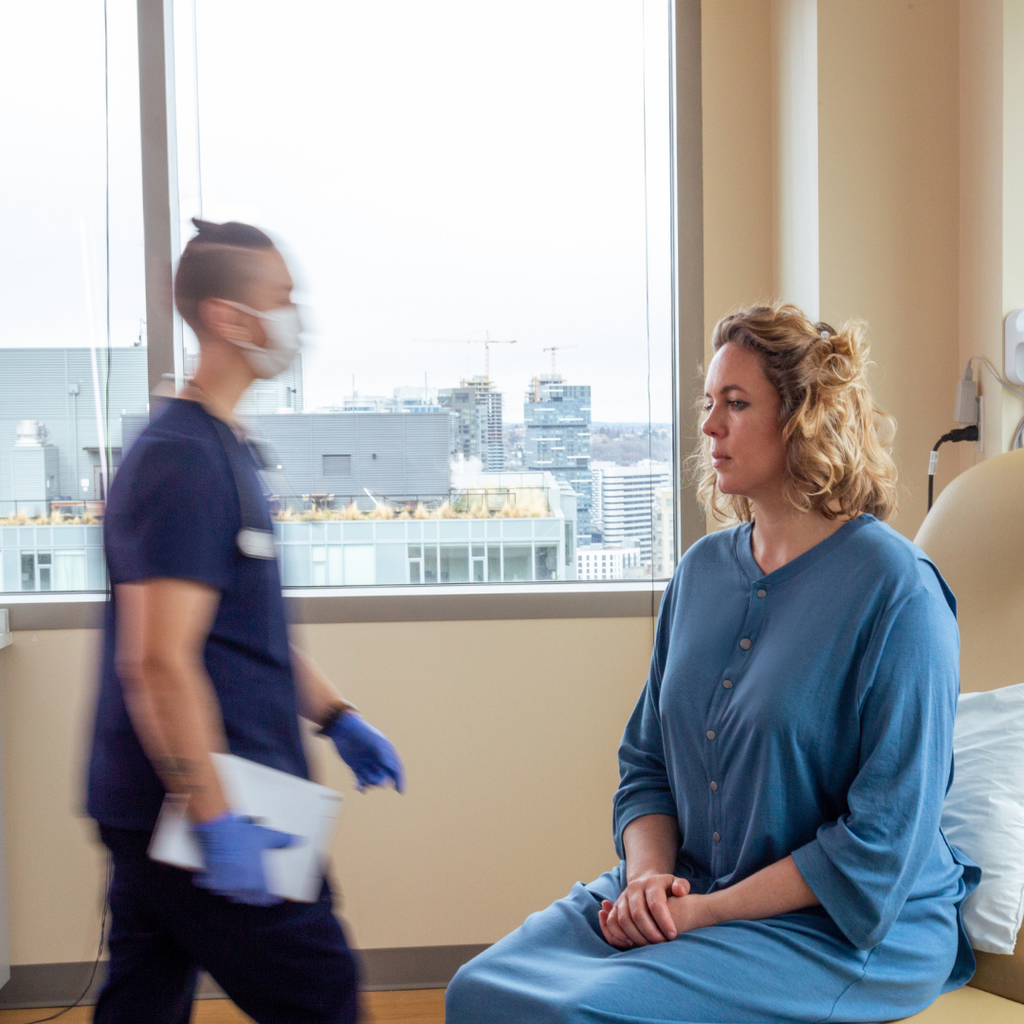Getting a Good Night’s Sleep in a New Place
We’ve all been there: lying awake in a new bed in an unfamiliar room, exhausted but unable to sleep. It’s stressful and it’s frustrating. And in moments when your body especially needs rest, like when you’re preparing for a procedure, recovering from surgery, or living with an illness, it can be particularly challenging.
It may not feel especially advantageous, but our difficulty sleeping in a new environment is actually an evolutionary adaptation, designed to protect us when we’re in an unfamiliar place. Even though we don’t face the same threats our ancient ancestors did, our bodies are on the lookout in the same way theirs were—staying highly vigilant in order to keep us safe. But there are lots of things you can do to help calm down your nervous system, and remind your body that you’re in a safe place so you can rest deeply. No matter what the environment, here are some of our favorite ways to ensure a good night’s sleep.
Modify your room
There are so many things in a new space that can interrupt your sleep: flashing lights, automated fans and cooling systems, street noise… Depending on where you are, there may be ways to adapt your room to address challenges like these. Are there curtains you can draw or windows you can close? Would a slight change to the angle of your bed make a difference? Maybe you can turn off the automated fan on a room’s air conditioning unit, or even cover an alarm clock so its bright display doesn’t wake you. If you’re in a hospital or long-term care facility, check with someone first to be sure that these changes are permitted. Let staff members know that you’re making these adjustments in order to facilitate your sleep, and it’s likely they’ll try their best to accommodate you.
Modify your response
Even when you can’t change anything about the room, there are small but impactful ways to respond to the sensory input that’s keeping you awake. An eye mask can help block out flashing monitors, sunlight that comes around the edges of the curtains, or any other visual stimuli. Ear plugs can block out beeping sounds, conversation, and the hustle and bustle of a facility around you. A white noise machine can have a similar effect, or some soothing background sounds can offer a meditative alternative. We love the wide range of no-cost offerings at mynoise.net, from summer birdsong, to rain on the roof, to ocean waves, and everything in between.
Add a familiar element
When you’re trying to fall asleep, the addition of something your body deeply knows and recognizes can make a big difference. If you or someone you love is going to be spending a little time in a care facility, consider bringing a pillow from home, or even just a pillowcase that’s been washed in your everyday detergent so the smell and the feel of the fabric are especially comfortable and familiar to you. A pair of favorite wool socks or a throw blanket can bring a touch of home. So can a framed picture of a favorite moment propped up on the bedside table—something calming and emotionally resonant to look at before going to bed (or the first thing when you wake).
Use warm beverages or aromatherapy
A cup of something gentle and warming is a timeless remedy for good reason. Caffeine-free herbal teas like mint, lemon balm, and chamomile are an effective, traditional way to reduce anxiety—and help you fall asleep. As always, we recommend checking with your healthcare practitioner before adding any herbal beverage or supplement into your nighttime routine. Aromatherapy is another way to incorporate the calming benefits of plants into the end of your day; try just a few drops of lavender, chamomile, or rose essential oils in a spritz bottle full of water. A few sprays on your pillow or sheets are a lovely way to encourage sleep. Before trying this, we recommend checking about the scent policy of your individual medical or care facility.
Reduce brain input
Whenever possible, give yourself an hour before bed that’s free from anything that might cause worry, anxiety, or even just overthinking. A habit of reading the news before bed, watching TV, or even sending a text or an email may mean that you’re making your brain more active at a time when you should be calming yourself instead. Even “good” stimulation like a phone call or a visit with someone you love can make it difficult to turn your brain off afterwards. Try reading something calming on paper instead of a screen, listening to a gentle audiobook narrated by a voice you like hearing, or relaxing with some music that matches a bedtime mood.
Create a bedtime ritual
Tooth-brushing, pajamas, a bedtime story… it may have been years since you’ve had a predictable bedtime routine, but there’s something innately comforting about offering yourself the very same nightly ritual for unwinding. If you’re bedridden or in post-surgery recovery, maybe it’s a warm washcloth on your face and neck, a clean pair of socks, and a moment to put lotion on your hands or face. If you have a bit more mobility, perhaps a gentle self-care ritual like brushing your hair (or having it brushed) is more appealing. Whatever nighttime routine feels right for you, it should be simple enough to do every night, and something you look forward to.
Getting a good night’s sleep in a new place might require a bit of creative thinking and problem-solving, but with a little experimentation, you’ll find the combination of factors that works for you or the loved one you’re caring for. You may even discover that your new routine brings a surprising sense of peace at the end of each day—a benefit that can impact health in so many positive ways at any time.
All of us at Arkeras wish you and your loved ones health and well-being, and plenty of deep, restful, restorative sleep.






